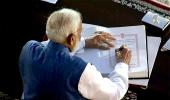The strong message from the prime minister is of continuity of policies he considers right with strong emphasis on execution, points out T N C Rajagopalan.

The constitution of the Union council of ministers, and the allocation of key portfolios send a clear message that the Prime Minister is firmly in control.
The allies in the ruling coalition have been accommodated but relegated to relatively less important ministries.
The key portfolios have gone to the loyalists in the major constituent of the ruling coalition, the Bharatiya Janata Party, and there again, mostly to the ministers who held the same portfolios earlier.
The ministries dealing with the economy and logistics infrastructure, that are of interest to the exporters, importers, and businesses at large, like finance and corporate affairs; commerce and industry; ports, shipping and waterways; road transport and highways; railways; electronics and information technology; petroleum and natural gas are now headed by the same ministers from the BJP who held the charge earlier.
The ministries like renewable energy, chemicals and fertilisers, communication, power, agriculture, coal and mines now have new ministers but from the BJP.
In the ministries like civil aviation, steel, heavy industries, micro, small and medium industries, fisheries, food processing, animal husbandry and dairying that are headed by the allies of the BJP, it is more likely that the top bureaucrats will call the shots under directions from the prime minister's office.
Thus, the second strong message from the prime minister is of continuity of policies he considers right with strong emphasis on execution.
Of course, some earlier policies may be tweaked depending on the feedback he receives.
One of the policies of interest to exporters and importers relates to building transport infrastructure that will reduce logistics costs substantially, and thus improve the competitiveness of our producers.
The government has substantially improved the road infrastructure.
However, the eastern and western dedicated freight corridors of the Railways have not yet been completed.
The Railways carry only 25 per cent of our cargo and the balance 75 per cent cargo moves through the road.
The cost of moving cargo by road is at least three times that of moving cargo through the Railways.
So, the Railways should shift the focus to improving network capacity and getting a higher share of cargo traffic.
The government must implement its plans to privatise the Container Corporation of India.
The new international airports at Navi Mumbai and Noida must be completed quickly.
The ports infrastructure must be strengthened by quickly completing the ongoing projects.
The government should make sure the monopolies in the logistics infrastructure sector do not misuse their dominance.
In recent years, the government has relied heavily on public expenditure to boost growth.
Domestic consumption and merchandise exports have not picked up.
The capacity utilisation of industries is around 75 per cent and so, private investment in manufacturing is rather tepid.
With technological advancements, the private industries are investing more in modernisation that will lead to higher output at lower costs.
So, fewer jobs are getting created in the manufacturing sector.
According to some analysts, joblessness was one of the reasons for the BJP getting 63 fewer seats in the Lok Sabha elections.
It is not clear whether the top leadership of the BJP is of the same view.
So far, there is no clear admission of any failure on the economy front, or any need for course correction.
Much depends on how the prime minister reads the situation and gives clear policy directions.
Feature Presentation: Aslam Hunani/Rediff.com












 © 2025
© 2025